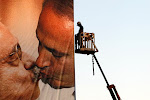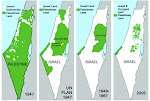Hebrew papers running Palestinian ads

The Palestinian Authority placed ads in Hebrew papers, to try and reach some kind of conflict resolution over contentious core issues through an outreach to the reading public inside "the so-called Jewish entity". Can they revive a six-year-old peace plan? Clearly, the Pal pals are pre-occupied. The BBC elaborates:
The Palestinian Authority has placed a full-page advert in Israel's Hebrew newspapers to promote an Arab peace plan first proposed in 2002.
The plan offers pan-Arab recognition of Israel in exchange for an end to Israel's occupation of land captured in the 1967 Arab-Israel war.
It also proposes what it calls a just solution for Palestinian refugees.
Israel has noted "positive aspects" in the plan but has not formally accepted it, largely over the refugee issue.
In a BBC interview coinciding with his presidential visit to the UK, veteran Israeli politician Shimon Peres praised the plan as a "sea-change" in Arab policy.
ARAB PEACE PLAN
Adopted by Arab League in 2002 and relaunched in 2007
Calls for "full Israeli withdrawal from all the Arab territories occupied since June 1967"
All Arab states would establish "normal relations... with Israel" and "consider the Arab-Israeli conflict ended"
Calls for a "just solution to the Palestinian refugee problem"
Defence Minister Ehud Barak said it could "serve as the basis" for negotiations.
Renewed interest in the Arab plan has arisen after a year of Israeli-Palestinian talks made no tangible progress and indirect contacts were revived between Syria and Israel, but also without achieving anything concrete.
Countering 'distortion'
The PA advertisement appears in the three main Hebrew dailies and is headed by the Palestinian and Israeli flags.
The text reads: "Fifty-seven Arab and Muslim countries will establish diplomatic relations with Israel in exchange for a full peace accord and the end of the occupation."
The advert includes the full text of the seven-point initiative and is framed by the flags of 50 Arab and Muslim countries.
Palestinian official Yasser Abed Rabbo said it was aimed at explaining the Arab peace initiative to the Israeli public.
He suggested that Israelis were unfamiliar with the details of the plan and have only heard partial and distorted versions from Israeli officials.
The Arab peace plan, originally devised by Saudi Arabia, was adopted by an Arab League summit in Beirut in 2002 and re-launched at the Riyadh summit in 2007.
Israeli reports described the direct appeal to Israelis by Palestinian leaders over the heads of Israel's politicians as an extraordinary event.
Many Israelis agree on returning most of the land occupied in 1967 but hold strong views on two elements of the plan - making East Jerusalem capital of a future Palestinian state, and discussing Palestinian refugees in the context of a peace deal.
Israel has proclaimed all Jerusalem, including the occupied eastern half, as its "eternal, undivided" capital, and has rejected any responsibility for the flight of refugees during conflicts since 1948 when Israel was founded.




















No comments:
Post a Comment